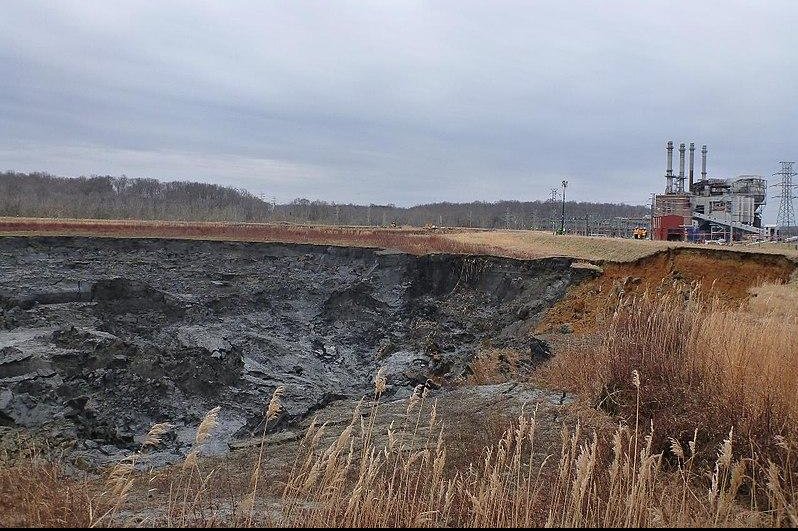A collapsed coal ash impoundment is seen near a closed power plant in Eden, N.C. Photo courtesy U.S. Environmental Protection Agency/
Wikimedia Commons
Nov. 30 (UPI) -- Toxic waste at more than 90 percent of Illinois' coal-fired power plants is polluting groundwater and putting drinking water in surrounding communities at risk, a new environmental report says.
The analysis conducted by multiple nonprofit environmental groups -- Environmental Integrity Project, Earthjustice, Prairie Rivers Network and the Sierra Club -- found 22 of the state's 24 dumpsites have released toxic pollutants into the groundwater.
The report is based on data supplied by industry reports on the power facilities.
"Because utilities were forced to report groundwater monitoring data in the 2015 coal ash rule, we now know the scope and severity of groundwater contamination from coal ash in Illinois," Earthjustice attorney Jennifer Cassel said in a statement. "Now that communities can see the evidence of toxic pollution leaking into their precious groundwater resources from these ponds for themselves, they can hold utilities and the state accountable."
According to the data, the toxins include 300,000 pounds of aluminum, 600 pounds of arsenic, nearly 300,000 pounds of boron, more than 200 pounds of cadmium, 15,000 pounds of manganese, 1,500 pounds of selenium, 500,000 pounds of nitrogen and nearly 40 million pounds of sulfate.
Because coal ash has been stored in unlined ponds and landfills for decades, experts say the toxins have slowly leaked into groundwater, as well as rivers and lakes throughout the state -- including the Middle Fork of the Vermilion River, Illinois' only National Scenic River.
The data showed, for example, arsenic contamination exceeds safe levels in groundwater monitoring wells at NRG-subsidiary Midwest Generation's Waukegan Plant on the shore of Lake Michigan, by over 2,000 times. Boron levels are more than 11 times the federal health threshold and more than 16 times Illinois' drinking water standard.
Experts say the pollution poses a threat to drinking water for nearby communities and human and aquatic life. Such maladies they could produce in humans are cancer, heart disease, reproductive failure and stroke, as well as lasting brain damage in children.
One of the report's findings said lead concentrations are 18 times the Environmental Protection Agency's drinking water standard at Dynegy's E.D. Edwards coal plant on the Illinois River, just south of Peoria.
Kim Biggs, a spokeswoman for Illinois' Environmental Protection Agency, told UPI Thursday the agency is reviewing the report -- but noted that it regulates coal ash ponds in "numerous ways" to prevent and treat groundwater contamination.
"The agency initiated a statewide coal ash impoundment strategy where it identified and required groundwater monitoring at coal ash ponds," she said. "Before there were federal rules for the construction, operation and closure of coal ash ponds, the agency proposed comprehensive regulations for these sites to the Pollution Control Board.
"After the federal rules were adopted in 2015, the agency began overseeing their implementation in Illinois through existing water pollution control state operating permits."
Biggs emphasized that Illinois' groundwater standards meet or exceed those at the federal level.
"At these facilities, the agency has also been enforcing Illinois groundwater quality standards, which are equivalent to, or more stringent than, the federal national primary drinking water regulations' maximum contaminate levels."
Some companies that own and operate the plants, including Dynegy, Southern Illinois Power Cooperative and City Water Power & Light, have proposed plans to de-water and consolidate coal ash stored in ponds and place a cover, or "cap," on top of the toxic waste.
The study, however, said those efforts would still expose groundwater to coal ash, because underlying ponds would continue to be unlined -- meaning there is no barrier beneath them to stop the contamination from spreading through the soil.
"Merely 'capping' these ash ponds means that these massive waste repositories will remain near rivers, lakes, streams and other water sources throughout the state -- in perpetuity," the environmental groups said in their report.
The groups also said plans by some operators, including Midwest Generation, to close ponds and remove the ash only partly solves the problem -- because they are not the only locations toxic ash has been dumped.
"For many years, coal ash at coal-fired power plants was simply dumped into unregulated pits around the plants, or used as 'fill' to flatten ground or build dikes for ash ponds in which more coal ash was dumped," the report says. "Until those old ash dumps and ash fill are excavated, toxic pollutants in that ash will continue leaching into Illinois' waters indefinitely."
Efforts by the state to develop rules against ash pond pollution, which began in 2013, have been unsuccessful and abandoned by previous Illinois administrations, the groups said.
Abel Russ, senior attorney at the Environmental Integrity Project, told UPI there probably isn't enough time for outgoing Gov. Bruce Rauner to make a difference in the matter. He said Illinois' EPA, though, could help by leaning on sites that are violating the ash rule.
"That's something that could be enforced by in federal court by citizens or by the Illinois EPA right now," he said.
Russ added that one of the most effective ways Gov.-elect J.B. Pritzker can clean up the problem is impose an outright and retroactive ban on storing coal ash in any groundwater -- whether it was done recently or years ago.
"Under the federal rule, you can't build a new impoundment any closer to groundwater than five feet," Russ said. "My coalition thinks that should apply to all coal ash, including the ash that's been put in the ground in the past."
"Anywhere you have coal ash that's in contact with groundwater, it creates a risk of ongoing leaking and contamination," he added. "That's the direction the state should go."















